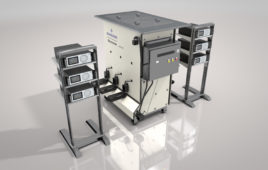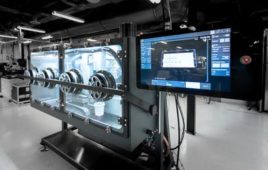
Inspection of microlens (a single lens that is part of a molded lens array). This kind of data is used to find defects and assess the overall shape of the molded part. This ensures design accuracy.
Accumold operates in an environment where part dimensions are sometimes minute, tolerances are always exacting, geometric complexity can be demanding, and zero failure rates and repeatability are paramount. The key to reaching sub-micron tolerances is risk mitigation, as each step in the product development process can potentially introduce tolerance stack-up. Control requires that Accumold is vertically integrated, with tooling, molding, validation, and automated assembly all under one roof, and each “department” collaborating to ensure optimal outcomes.
Validation is crucial, which is why Accumold partnered with non-contact optical metrology specialist, ZYGO, to manage some of its more demanding measurement and validation work. Nowhere is the well-worn phrase “if you cannot measure it, you cannot make it” more relevant than in the world of micro molding. Here, parts are often used in safety-critical applications and can be as small as a grain of sand.
Accumold’s metrology capability is critical during micro-molding processes — from initial experimental design runs and stress tests to prototype and production qualifications runs. With measurement taking this central role, metrology moves from being a necessary evil to an enabling technology. Accumold’s metrologists have been successful in helping customers improve their design, re-dimension parts, and better use Geometric Dimensioning & Tolerancing (GD&T) so that the part is easier to mold, easier to measure, and performs better for the end-user.
Often in micro-molding scenarios, metrology and validation-related issues can be challenging, with part size, part fixturing, print tolerances, and surface roughness introducing complexities. Of these, part size is the most critical challenge. Micro-molded parts can be dimensioned in microns, with features that only become visible under 10x (or greater) magnification. With such small part sizes, non-contact metrology is the best solution.
It is essential to determine how to fixture the part being inspected so repeatable and reproducible measurements are achieved. Accumold designs and manufactures steel or 3D plastic custom fixtures designed to hold parts in various orientations to ensure they can measure all the features in either automated or manual measurement processes.
Another challenge for these components is surface roughness. Due to the small size and essential finish requirements, slight variations can have more dramatic effects on the final product than might be observed with a larger component. Non-contact metrology tools are vital for such applications, as tactile tools can compromise surface integrity.
Metrology instruments are constantly evolving, and it is essential to assess new technology continually. Accumold uses various advanced metrology technology, including automated vision inspection (AVI), robotic handling, and non-contact optical surface metrology, such as the coherence scanning interferometer equipment from ZYGO to measure micro features and surface roughness.
Industry perceptions of optical metrology systems have changed in recent years, and its uptake is growing year to year. There are obvious reasons for this: its ability to measure without damaging surfaces or features on sometimes delicate components. However, optical metrology also stimulates the move to greater manufacturing automation due to its speed compared to contact systems. It can also quickly undertake full-field measurement rather than focusing on specific part features one at a time.

The diamond-turned surface shows the texture of a piece of injection molding tooling for an optical surface. Understanding and controlling the texture on the mold tooling is important as it will transfer directly into the finished part.
Accumold has used ZYGO optical profilers for many years, starting with the NewView 7300 and later adding the next generation NewView 8300 to the fleet. The main reason for selecting ZYGO was to accurately measure parts made from high temperature and clear resins used to mold lenses.
One of the best ways to derive maximum value from metrology is to work more as partners and collaborators to solve a challenging problem. The first collaboration’s optical profiler was the NewView 7300. Both company’s engineering teams devised a customized analysis routine for the micro-molded lenses that were being made. As the technology evolved, the two companies continued to work together to solve metrology issues both on the original tool and on the NewView 8300 and its latest software platform.
Instead of simply purchasing a tool, ZYGO and Accumold have maintained a dialogue to ensure ZYGO’s product and capability roadmap reflects Accumold’s metrology needs — continually providing value across their entire organization. Accumold thinks that working collaboratively with metrology suppliers is the future and will ensure that technology evolves with market and customer needs.
Zygo
www.zygo.com
Filed Under: Molding • injection molding components




